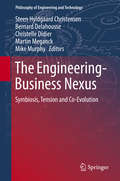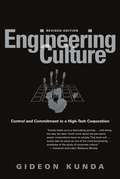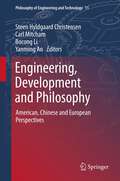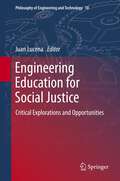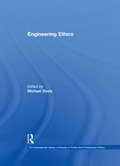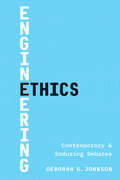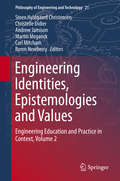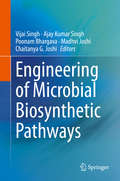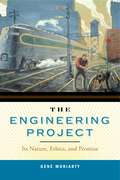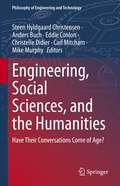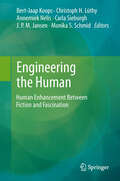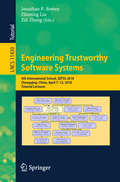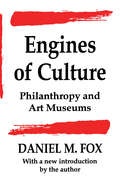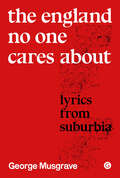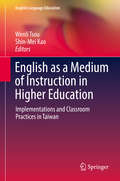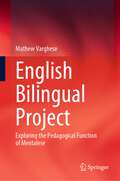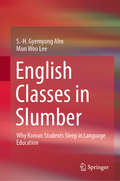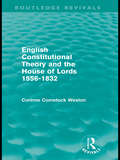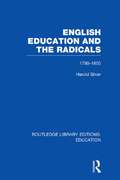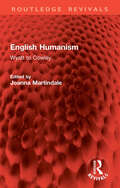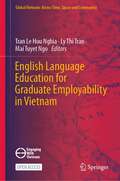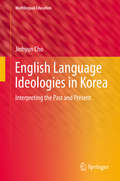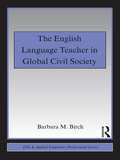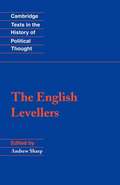- Table View
- List View
The Engineering-Business Nexus: Symbiosis, Tension and Co-Evolution (Philosophy of Engineering and Technology #32)
by Steen Hyldgaard Christensen Christelle Didier Martin Meganck Mike Murphy Bernard DelahousseFascinating and compelling in equal measure this volume presents a critical examination of the multilayered relationships between engineering and business. In so doing the study also stimulates ethical reflection on how these relationships either enhance or inhibit strategies to address vital issues of our time. In the context of geopolitical, economic, and environmental tendencies the authors explore the world that we should want to create and the role of the engineer and the business manager in this endeavor. Throughout this volume the authors identify periods of alignment and periods of tension between engineering and business. They look at focal points of the engineering-business nexus related to the development of capitalism. The book explores past and present movements to reshape, reform, or reject this nexus.The volume is informed by questions of importance for industry as well as for higher education. These are: What kinds of conflict arise for engineers in their attempts to straddle both professional and organizational commitments? How should professionals be managed to avoid a clash of managerial and professional cultures? How do engineers create value in firms and corporations? What kinds of tension exist between higher education and industry? What challenges does the neoliberal entrepreneurial university pose for management, faculty, students, society, and industry? Should engineering graduates be ready for work, and can they possibly be? What kinds of business issues are reflected in engineering education curricula, and for what purpose? Is there a limit to the degree of business hybridization in engineering degree programs, and if so, what would be the criterion for its definition? Is there a place in engineering education curricula for reflective critique of assumptions related to business and economic thinking? One ideal of management and control comes to the fore as the Anthropocene - the world transformed into an engineered artefact which includes human existence. The volume raises the question as to how engineering and business together should be considered, given the fact that the current engineering-business nexus remains embedded within an economic model of continual growth. By addressing macro-level issues such as energy policy, sustainable development, globalization, and social justice this study will both help create awareness and stimulate development of self-knowledge among practitioners, educators, and students thereby ultimately addressing the need for better informed citizens to safeguard planet Earth as a human life supporting system.
Engineering Culture: Control and Commitment in a High-Tech Corporation
by Gideon KundaEngineering Culture is an award-winning ethnography of the engineering division of a large American high-tech corporation. Now, this influential book—which has been translated into Japanese, Italian, and Hebrew—has been revised to bring it up to date. In Engineering Culture, Gideon Kunda offers a critical analysis of an American company's well-known and widely emulated "corporate culture. " Kunda uses detailed descriptions of everyday interactions and rituals in which the culture is brought to life, excerpts from in-depth interviews and a wide variety of corporate texts to vividly portray managerial attempts to design and impose the culture and the ways in which it is experienced by members of the organization. The company's management, Kunda reveals, uses a variety of methods to promulgate what it claims is a non-authoritarian, informal, and flexible work environment that enhances and rewards individual commitment, initiative, and creativity while promoting personal growth. The author demonstrates, however, that these pervasive efforts mask an elaborate and subtle form of normative control in which the members' minds and hearts become the target of corporate influence. Kunda carefully dissects the impact this form of control has on employees' work behavior and on their sense of self. In the conclusion written especially for this edition, Kunda reviews the company's fortunes in the years that followed publication of the first edition, reevaluates the arguments in the book, and explores the relevance of corporate culture and its management today.
Engineering, Development and Philosophy
by Steen Hyldgaard Christensen Yanming An Bocong Li Carl MitchamThis inclusive, cross-cultural study rethinks the nexus between engineering, development, and culture. It offers diverse commentary from a range of disciplinary perspectives on how the philosophies of today's cultural triumvirate--American, European and Chinese--are shaped and given nuance by the cross-fertilization of engineering and development. Scholars from the humanities and social sciences as well as engineers themselves reflect on key questions that arise in this relational context, such as how international development work affects the professional views, identities, practice and ethics of engineers. The first volume to offer a systematic and collaborative study that cuts across continental boundaries, the book delineates the kinds of skills and competences that tomorrow's engineering success stories will require, and analyzes fascinating aspects of the interplay between engineering and philosophy, such as how traditionally Chinese ways of thinking can influence modern engineering practice in the world's most populous country. China's problematic mix of engineering woes and wonders, from the high-profile crash on its high-profile rail network to its 'bird's nest' Olympic stadium, adds to the urgency for reform, while Europe's Enlightenment-informed legal frameworks are contrasted with Chinese mechanisms in their governance of the field of nanotechnology, a crucial element of future technical evolution. Fascinating and compelling in equal measure, this volume addresses one of the topics at the leading edge of humanity's quest to survive, and to thrive.
Engineering Education for Social Justice: Critical Explorations and Opportunities
by Juan LucenaHoping to help transform engineering into a more socially just field of practice, this book offers various perspectives and strategies while highlighting key concepts and themes that help readers understand the complex relationship between engineering education and social justice. This volume tackles topics and scopes ranging from the role of Buddhism in socially just engineering to the blinding effects of ideologies in engineering to case studies on the implications of engineered systems for social justice. This book aims to serve as a framework for interventions or strategies to make social justice more visible in engineering education and enhance scholarship in the emerging field of Engineering and Social Justice (ESJ). This creates a 'toolbox' for engineering educators and students to make social justice a central theme in engineering education.
Engineering Ethics: Studies In The Ethics Of A Profession (The International Library of Essays in Public and Professional Ethics)
by Michael DavisThis volume is a collection of articles published since engineering ethics developed a distinct scholarly field in the late 1970s that will help define the field of engineering ethics. Among the perennial questions addressed are: What is engineering (and what is engineering ethics)? What professional responsibilities do engineers have and why? What professional autonomy can engineers have in large organizations? What is the relationship between ethics and codes of ethics and how should engineering ethics be taught?
Engineering Ethics: Contemporary and Enduring Debates
by Deborah G. JohnsonAn engaging, accessible survey of the ethical issues faced by engineers, designed for students The first engineering ethics textbook to use debates as the framework for presenting engineering ethics topics, this engaging, accessible survey explores the most difficult and controversial issues that engineers face in daily practice. Written by a leading scholar in the field of engineering and computer ethics, Deborah Johnson approaches engineering ethics with three premises: that engineering is both a technical and a social endeavor; that engineers don&’t just build things, they build society; and that engineering is an inherently ethical enterprise.
Engineering Identities, Epistemologies and Values
by Steen Hyldgaard Christensen Christelle Didier Andrew Jamison Martin Meganck Carl Mitcham Byron NewberryThis second companion volume on engineering studies considers engineering practice including contextual analyses of engineering identity, epistemologies and values. Key overlapping questions examine such issues as an engineering identity, engineering self-understandings enacted in the professional world, distinctive characters of engineering knowledge and how engineering science and engineering design interact in practice. Authors bring with them perspectives from their institutional homes in Europe, North America, Australia\ and Asia. The volume includes 24 contributions by more than 30 authors from engineering, the social sciences and the humanities. Additional issues the chapters scrutinize include prominent norms of engineering, how they interact with the values of efficiency or environmental sustainability. A concluding set of articles considers the meaning of context more generally by asking if engineers create their own contexts or are they created by contexts. Taken as a whole, this collection of original scholarly work is unique in its broad, multidisciplinary consideration of the changing character of engineering practice.
Engineering of Microbial Biosynthetic Pathways
by Vijai Singh Ajay Kumar Singh Poonam Bhargava Madhvi Joshi Chaitanya G. JoshiThis book provides a comprehensive overview of the basic and advanced metabolic engineering technologies used to generate natural metabolites and industrially important biomolecules. Metabolic engineering has the potential to produce large quantities of valuable biomolecules in a renewable and sustainable manner by extending or modifying biosynthetic pathways in a wide range of organisms. It has been successfully used to produce chemicals, drugs, enzymes, amino acids, antibiotics, biofuels, and industrially important pharmaceuticals. The book comprehensively reviews the various metabolites detection, extraction and biosensors and the metabolic engineering of microbial strains for the production of industrially useful enzymes, proteins, organic acids, vitamins and antibiotics, therapeutics, chemicals, and biofuels. It also discusses various genetic engineering and synthetic biology tools for metabolic engineering. In closing, the book discusses ethical, patenting and regulatory issues in the metabolic engineering of microbes. This book is a valuable source not only for beginners in metabolic engineering, but also students, researchers, biotechnology and metabolic engineering based company.
The Engineering Project: Its Nature, Ethics, and Promise
by Gene MoriartyWe all live our daily lives surrounded by the products of technology that make what we do simpler, faster, and more efficient. These are benefits we often just take for granted. But at the same time, as these products disburden us of unwanted tasks that consumed much time and effort in earlier eras, many of them also leave us more disengaged from our natural and even human surroundings. It is the task of what Gene Moriarty calls focal engineering to create products that will achieve a balance between disburdenment and engagement: “How much disburdenment will be appropriate while still permitting an engagement that enriches one’s life, elevates the spirit, and calls forth a good life in a convivial society?”One of his examples of a focally engineered structure is the Golden Gate Bridge, which “draws people to it, enlivens and elevates the human spirit, and resonates with the world of its congenial setting. Humans, bridge, and world are in tune.” These values of engagement, enlivenment, and resonance are key to the normative approach Moriarty brings to the profession of engineering, which traditionally has focused mainly on technical measures of evaluation such as efficiency, productivity, objectivity, and precision. These measures, while important, look at the engineered product in a local and limited sense. But “from a broader perspective, what is locally benign may present serious moral problems,” undermining “social justice, environmental sustainability, and health and safety of affected parties.” It is this broader perspective that is championed by focal engineering, the subject of Part III of the book, which Moriarty contrasts with “modern” engineering in Part I and “pre-modern” engineering in Part II.
Engineering, Social Sciences, and the Humanities: Have Their Conversations Come of Age? (Philosophy of Engineering and Technology #42)
by Steen Hyldgaard Christensen Anders Buch Eddie Conlon Christelle Didier Carl Mitcham Mike MurphyThis book presents a critical examination of conversations between engineering, social sciences, and the humanities asking whether their conversations have come of age. These conversations are important because ultimately their outcome have real world consequences in engineering education and practice, and for the social and material world we inhabit. Taken together the 21 chapters provide scholarly-argued responses to the following questions.Why are these conversations important for engineering, for social sciences, and for the humanities?Are there key places in practice, in the curriculum, and in institutions where these conversations can develop best?What are the barriers to successful conversations?What proposals can be made for deepening these conversations for the future?How would we know that the conversations have come of age, and who gets to decide?The book appeals to scholarly audiences that come together through their work in engineering education and practice. The chapters of the book probes and access the meetings and conversations, and they explore new avenues for strengthening dialogues that transcend narrow disciplinary confines and divisions.“The volume offers a rich collection of descriptive resources and theoretical tools that will be useful for researchers of engineering practices, and for those aiming to reshape the engineering lifeworld through new policies. The book depicts the current state of the art of the most visible SSH contributions to shaping engineering practices, as well as a map of research gaps and policy problems that still need to be explored.” - Dr. Ir. Lavinia Marin, TU Delft, Electrical Engineering and Philosophy
Engineering the Human
by Carla Sieburgh Bert Jaap Koops J.P.M. Jansen Monika S. Schmid Annemiek Nelis Christoph H. LüthyThe volume is collection of articles treating the topic of human improvement/enhancement from a variety of perspectives - philosophical, literary, medical, genetic, sociological, legal etc. The chapters in this volume treat not only those aspects that most immediately come to mind when one thinks of 'human enhancement', such as genetic engineering, cloning, artificial implants and artificial intelligence etc. Somewhat less obvious aspects include evolutionary perspectives in connection with the prolongation of the human lifespan, plastic surgery since its beginnings, and questions such as whether the distinction between 'natural' and 'artificial' can really be drawn at all and how it has been conceived across the ages, or what the legal implications are of recent developments and techniques. Many papers make links to the representation of these developments in popular culture, from Jules Verne through Aldous Huxley to the movie Gattaca, address the hopes and fears that come with them as well as the question how realistic these are. While all chapters are written by scientists at the international top of their respective fields, all are accessible to a non-specialist audience and eminently readable. We believe that they represent a state-of-the art overview of questions that are of interest to a large audience. The book thus targets a non-specialist audience with an interest in philosophical, sociological, scientific and legal issues involved in both traditional and recent matters concerning the desire of mankind to improve itself, the human body, the human mind and the human condition. It is unique in that it brings together all these aspects within a coherent and cohesive collection.
Engineering Trustworthy Software Systems: 4th International School, SETSS 2018, Chongqing, China, April 7–12, 2018, Tutorial Lectures (Lecture Notes in Computer Science #11430)
by Jonathan P. Bowen Zhiming Liu Zili ZhangThis volume contains lectures on leading-edge research in methods and tools for use in computer system engineering; at the 4th International School on Engineering Trustworthy Software Systems, SETSS 2018, held in April 2018 at Southwest University in Chongqing, China.The five chapters in this volume provide an overview of research in the frontier of theories, methods, and tools for software modelling, design, and verification. The topics covered in these chapter include Software Verification with Whiley, Learning Büchi Automata and Its Applications, Security in IoT Applications, Programming in Z3, and The Impact of Alan Turing: Formal Methods and Beyond. The volume provides a useful resource for postgraduate students, researchers, academics, and engineers in industry, who are interested in theory, methods, and tools for the development of trustworthy software.
Engines of Culture: Philanthropy and Art Museums
by Daniel M. FoxFirst Published in 2018. Routledge is an imprint of Taylor & Francis, an Informa company.
The England No One Cares About: Lyrics from Suburbia (Goldsmiths Press / Sonics Series)
by George MusgraveAn exploration of the much-derided English suburbs through rap music.There are many different Englands. From the much-romanticized rolling countryside, to the cosmopolitanism of the inner cities (embraced by some as progressive, multicultural enlightenment and derided by others as the playground of a self-righteous metropolitan elite), or the disparagingly named "left behind" communities which, post-Brexit, have so interested political parties and pundits, demographers and statisticians.But there is also an England no one cares about. The England of semi-detached houses and clean driveways for multiple cars devotedly washed on Sundays, of "twitching curtains" and Laura Ashley sofas; of cul-de-sacs to nowhere and exaggerated accents; of late night drives to petrol stations on A roads, fake IDs tested in Harvesters, and faded tracksuits and over-gelled hair in Toby Carverys; of questionable hash from a "mate of a mate" and two-litre bottles of White Lightning from Budgens consumed in a kids playground. Much derided. Unglamorous, ordinary; cultural vacuity and small "c" conservatism. A hodgepodge. An—apparently—middling, middle-of-the-road middle-England of middle-class middle-mindedness. Part poetry anthology, part academic study into placemaking, and part autoethnography, The England No One Cares About innovatively brings together academic discussions of the ethnographic potential of lyrics, scholastic representations of suburbia, and thematic analysis to explore how rap music can illuminate the experiences of young men growing up in suburbia. This takes place by exploring the author&’s own annotated lyrics from his career as a musician known as Context where he was referred to by the BBC as "Middle England&’s Poet Laureate."
English as a Medium of Instruction in Higher Education
by Wenli Tsou Shin-Mei KaoThis book presents the multiple facets of English as a Medium of Instruction (EMI) in higher education across various academic disciplines, an area that is expected to grow constantly in response to the competitive global higher education market. The studies presented were conducted in various EMI classrooms, with data collected from observing and documenting the teaching activities, and from interviewing or surveying EMI participants. Through data analysis and synthesis, cases across disciplines - from engineering, science, technology, business, social science, medical science, design and arts, to tourism and leisure service sectors - are used to illustrate the various EMI curriculum designs and classroom practices. Although the cases described are limited to Taiwanese institutions, the book bridges the gap between planning and executing EMI programs across academic domains for policy makers, administrators, content teachers, and teacher trainers throughout Asia.
English Bilingual Project: Exploring the Pedagogical Function of Mentalese
by Mathew VargheseToday, English is the global lingua franca and competent English communication skills should be one of the rights of all educated individuals irrespective of any socio-cultural limits. By introducing a new method, this book focuses on helping any learner to get sufficient communication skills in English as much as in the native language. This method helps one to avoid translating from mother tongue to English. And by using the method of thinking in English, one could acquire the required English bilingual skills naturally. The method is founded on the philosophical idea of mentalese—mind language as the base language of thinking available for humans for constructing thoughts. The proposed English Bilingual Project (EBP) helps one to transfer thoughts from a structureless mentalese to the grammatical structure of any language English/Japanese/Chinese. The method described in this book works in two ways: one it helps one to intuitively understand the working of mentalese; the other is by practicing think in English with the mentalese, one could generate the bilingual brain. The main procedure for transferring thoughts from the mentalese to English is through writing one’s thoughts. This helps one to think effectively in English like one’s own mother tongue. This method works as a prime requirement model for one to generate multilingual skills. The book resourced the idea of mentalese from the classical philosophy, reflects it with the modern generative theories, links it with the studies in neuro-linguistic studies on bilingualism and the bilingual brain.
English Classes in Slumber: Why Korean Students Sleep in Language Education
by Mun Woo Lee S.-H. Gyemyong AhnThis book explains why some Korean high school students sleep during English classes in spite of the emphasized value of English in their society. It examines how this sleeping-in-class phenomenon can be understood by means of such marginalized students’ emic outlooks on themselves, the target language, their teachers, schools, and society/culture; and by means of the views of teachers who have experienced such in-class sleepers. To understand the phenomenon more holistically, it pursues a multi-disciplinary approach drawing on studies of demotivation and amotivation, psychological needs, and student experiences of schooling, as well as sociocultural theories of learning and agency and of interpersonal dynamics, among others. On the basis of a multi-modal analysis of interview data from the student and teacher participants, it theoretically interprets the phenomenon at the classroom (‘micro-’), school (‘meso-’) and society-culture (‘macro-’) levels. Taking a humanistic/existential approach to education, it subsequently presents a number of cultural actions that it advocates implementing in a situation-sensitive manner to help in-class sleepers and their educational institutions awaken from their chronic slumber. Lastly, it presents practical and theoretical implications for more humanistic pedagogy, and global studies of student disengagement, in English-as-a-foreign-language classes.
English Constitutional Theory and the House of Lords 1556-1832 (Routledge Revivals)
by Corinne WestonFirst published in 1965, this work studies the House of Lords and the various proposals for its reform, abolition or limitation of its powers which have been made in the light o f prevailing theories of the nature and characteristics of the English government. The work also contains a history of the theory of mixed government that arose in Tudor England and lasted until well after the Reform Act of 1832. This history both illuminates the position of the House of Lords and also provides perspective for the study of Democracy in the movement for parliamentary reform. One of the book's most original features is an extensive account of Charles I's Answer to the Nineteen Propostions, out of which came the startling new theory of the constitution, known as "mixed monarchy".
English Education and the Radicals: 1780-1850 (Routledge Library Editions: Education)
by Harold SilverThe radicalism of the period from the 1780s to the mid-nineteenth century represented a harnessing of knowledge in protest against injustices and oppression, a pooling of effort to transform society. In this book the author explores the main strains in working and middle-class radicalism over this crucial period, with emphasis on the educational ideas and activities of radical movements, their spokesmen and ideologies. The author stresses some of the central educational interests of radical movements through the radical organizations of the 1780s and 1790s, and early nineteenth-century political and social movements, including the utilitarians, Owenites, Chartists and Tory radicals. He discusses educational ideas and action with regard to infants and adults, basic literacy and political understanding, examines some of the forms of study, self-education and propaganda to political action. This book is a study in miniature of the processes of political and social change in a period of industrial, political and social revolution – its theme is education in its widest sense.
English Humanism: Wyatt to Cowley (Routledge Revivals)
by Joanna MartindaleThe literature of the English Renaissance demands some attention to the intellectual and educational background which produced it, in order to be seen in proper perspective. The selection in this book, originally published in 1985, both illustrate the intellectual climate of the English Renaissance and exemplify some of its characteristics, though not strictly literary products. These include education, classicism and imitation, wisdom and eloquence, history and moral philosophy, religion and vernacular scripture. Erasmus has been given a dominant place in the anthology as the main mediator of humanist ideas to England; other authors represented include Castiglione, Machiavelli, Sir Thomas Elyot, Roger Ascham and Ben Jonson. This volume charts precisely the debt of English Renaissance literature to Continental Humanism and the classical revival and is a valuable contribution to an understanding of the literature and society of the time.
English Language and General Studies Education in the United Arab Emirates: Theoretical, Empirical and Practical Perspectives (English Language Teaching: Theory, Research and Pedagogy)
by Christine Coombe Georgia Daleure Lana HiasatThis book presents an up-to-date account of current English-language English teaching and General Studies practices in the UAE. The chapters, written by leading language teacher educators, feature theoretical and empirical aspects of teaching, learning, assessment as well as related research. Throughout the book, the link between theory and practice is highlighted and exemplified. This reader-friendly book is suitable for undergraduate and graduate students, teachers, researchers and administrators of English language and general studies programs in the UAE and beyond who wish to keep abreast of recent developments in the field.
English Language Education for Graduate Employability in Vietnam (Global Vietnam: Across Time, Space and Community)
by Tran Le Huu Nghia Ly Thi Tran Mai Tuyet NgoThis open access book examines the teaching and learning of English for employability in Vietnamese higher education. Its content is framed within one country to better examine the research issues within the influence of contextual factors. This book investigates how English can contribute to the development of students' employability capitals, particularly in the aspects of human capital, social capital, cultural capital, identity capital, and psychological capital. It presents employers' and employees’ perspectives of how and why English is increasingly important for career development. This book is a collection of discussions and viewpoints from teachers, students, and other stakeholders like employers, graduates, and course coordinators on current practices and their proposed improvements to prepare students for their future education, work and life. Based on empirical evidence, this book calls for repositioning English language education within the employability agenda to elevate its status and increase stakeholders' engagement. This book contributes to current debates on advancing the effectiveness of English language education in non-English speaking countries, as a response to internationalization and globalization.
English Language Ideologies in Korea
by Jinhyun ChoThis volume critically examines the phenomenon of "English fever" in South Korea from both micro- and macro-perspectives. Drawing on original research and rich illustrative examples, the book investigates two key questions: why is English so popular in Korea, and why is there such a gap between the 'dreams' and 'realities' associated with English in Korea? These questions are explored through the eyes of English-Korean translators and interpreters, who represent the professional group most intensely engaged in the zeal for English language mastery. Macro-perspectives focus on historical factors leading to the rise of English, with English-Korean translation and interpreting as a key theme. Micro-perspectives explore the dreams that individuals attach to English and the ways in which they imagine it can transform their lives, and contrast these dreams with the stark realities felt on the ground. The gaps between these dreams and realities are explored from various angles, which include commodification, gender and neoliberalism. The book thus offers fresh insights on how the phenomenon of "English fever" has been created, reproduced, and sustained from both historical and contemporary viewpoints.
The English Language Teacher in Global Civil Society (ESL & Applied Linguistics Professional Series)
by Barbara M. BirchHow can English language teachers contribute to peace locally and globally? English language teachers and learners are located in the global civil society – an international network of civil organizations and NGOs related to human rights, the environment, and sustainable peace. English, with its special role as an international language, is a major tool for communication within this network. On the local level, many teachers are interested in promoting reconciliation and sustainable peace, but often do not know how to do so. This book provides information, analysis, and techniques to help teachers around the world take action toward this goal. Balancing, in a readable and accessible way, the global and the local, core and periphery, cultural diffusion and resistance, theory and practice, pessimism and optimism, outsider and insider perspectives, the expert role and the apprentice role, and prescriptive and elicitive methods, it offers an alternative to literature about critical applied linguistics, globalization, and peace education that is simply too complex and wordy to spread easily from theoretician to the classroom teacher. The English Teacher in Global Civil Society: synthesizes threads from many fields and topics into a coherent and empowering argument for the activist role English language teachers can take to promote social change draws on humanistic education, peace education, cross-cultural understanding, problem-posing, cooperative learning, and critical thinking methodologies to help English language teachers learn how to teach conflict resolution skills in their classrooms covers issues in critical applied linguistics, approaches and methodologies in ESL/EFL, global and local curricular issues, and specific skill areas such reading, writing, and speaking suggests a new goal for English language teachers: global citizenship. This engaging, informative, provocative, and highly readable book is a welcome resource for English language teacher trainers, pre-service teachers, practicing classroom teachers, and Peace Corps workers around the world.
The English Levellers
by Andrew SharpThe levellers were a crucial component of a radically democratic movement that came together during the English civil wars. Much leveller activity occurred in print and their texts now form an important part of the liberal and social democratic canon. This edition contains an introduction by the editor that sets the leveller ideas in their context and, together with a chronology and short biographies of the leading figures, is essential reading for students of the English civil wars and the history of political thought.
